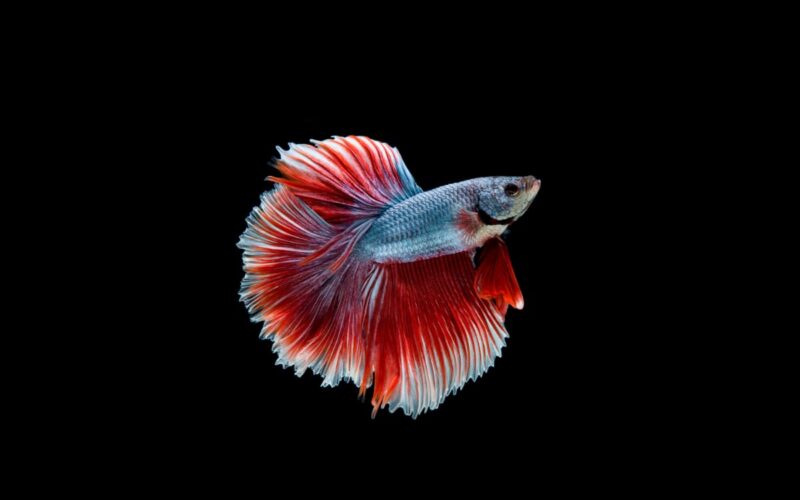All living things need the presence of light to survive. Plants will need it to be able to photosynthesize, whereas humans will require it to assist them in their daily work.
Similarly, animals that live on land will have a constant need for illumination throughout their lives.
However, does the same hold true for the animals that live in the water? Especially for ornamental fish like bettas and the like.
Do Betta fish really need light to live? If you want to learn more about the specific answer, check out the following article.
Light Needs for Betta Fish
Betta fish can be found in the wild in rivers, canals, and other areas with muddy water. This environment lacks natural illumination due to the difficulty of light penetrating the water. Due to this reason, Bettas can thrive in low-light environments.
Being able to see in the dark allows them to locate prey and avoid danger. When exposed to light, a Betta’s activity level rises. They can keep a healthy and fit lifestyle by doing things like swimming in the area.
However, the issue is that they may not have different night or day eyesight. As a result, when the aquarium lighting is dim, they gravitate toward the areas with the least amount of cloudiness.
In addition, Betta fish, like people, are used to a day or night cycle of twenty-four hours. Keeping them in the dark for days at a time can cause serious health problems and even changes in their behavior.
In essence, even though Betta fish don’t need light all the time, it can still help them because they will prefer to stay in the aquarium, where they can enjoy the bright lighting.
How Many Hours of Light Does a Betta Fish Need?
If you have some kinds of aquatic plants growing in your aquarium, they will need light to thrive and grow properly. Of course, it is also needed for this particular species. Betta fish needs to be in the light for about eight to twelve hours a day.
Some people recommend increasing the amount of time that your Betta fish is exposed to light during the winter months.
This is done to help keep their fish healthy and happy throughout the colder months. Based on what has been said so far, betta fish should also have between twelve and sixteen hours of darkness each day.
Do Betta Fish Need Light During the Night?
Betta fish are awake and active during the day, emulating human behavior. They rely on light to tell them when to wake up, when to eat, and when to sleep. If they don’t have this, their immune system slowly gets worse, which makes them more likely to get stressed out and sick.
Betta fish have lateral lines that run along their bodies, enabling them to detect movement, change, and water pressure. This means that they will be aware of approaching objects and will be able to avoid colliding with them even if they are in a dark environment with no night light. As a result, there is no real need for illumination at night.
However, the use of a lamp with a dark color is suggested if you wish to visualize your Betta during that time.
Natural Light vs. Artificial Light
When it comes to aquarium lighting, we don’t always know what will work best. Do the fish need natural light? Or an artificial one? Here, we’ll evaluate the benefits and drawbacks of both of these options.
Natural Light
The light emitted by the sun is essential to your animal companion’s health and well-being. Betta fish benefit from UV light exposure because it allows them to control the length of their day.
The production of vitamin D, which is required for the healthy growth and skin of betta fish, is aided by sunlight. Furthermore, it may assist the growth of plants in your aquarium.
However, it does have some drawbacks if the sunlight entering your fish tank is particularly intense. The fish in your aquarium will almost certainly be exposed to direct sunlight if you keep it outside.
If something like this remains for an extended period of time, the aquarium may become overheated. The fish will become overheated and unable to move freely in these conditions.
Additionally, the average temperature of the atmosphere can reach more than 35 degrees Celsius during the warmer months of the year. If fish are kept in aquariums that are heated to very high temperatures for a long time, they could have seizures, heart failure, or even die.
Aside from that, algae can thrive at any time of day or night with the help of sunlight. Algal blooms can cloud the water in your tank and cause it to become contaminated with harmful toxins. Affected fish may experience loss of appetite, deterioration in health, and eventually death.
Artificial Light
Many people supplement the natural sunlight in their aquariums with artificial lighting. To address this, a variety of fluorescent light bulbs can be used. This fixture allows you to control the amount of light that enters the aquarium.
A beautiful aquarium can be enhanced by using a variety of color displays. However, keep in mind that different colors of artificial light affect fish differently and can be extremely harmful to their health.
In addition, an excess of this light has a number of negative consequences. Biting and chasing other fish in the aquarium is just the beginning of aggressive behavior in aquarium fish that can lead to confusion and even death.
If you expose your betta to too much artificial light, it may lose its appetite. As a result, the animal will most likely starve to death.
Light’s Settings in a Tank
Your fish requires eight to twelve hours of light per day and twelve to sixteen hours of darkness per night. The simplest way to do this is to turn on the light when you first wake up and turn it off when you go to sleep.
If you’re concerned about forgetting, you can install automatic timer lighting in the aquarium. Then, you have to choose to use a lamp designed specifically for aquariums.
Furthermore, look for lights that have a dim setting so you can control how much light your Betta receives at different times of the day, especially if your tank is exposed to sunlight.
Lastly, the size of your aquarium determines the size of the lamp you require. A typical fish tank requires 1.5 to 4 watts of artificial light per gallon of water.
Your question about “Do Betta fish need light?” has been fully answered after you have read and comprehended the information provided above. Then, the following step is to ensure that the aquarium has adequate lighting, which is essential.
You have the option of using only natural light or supplementing it with artificial lighting. Everything will unfold according to your preferences. Make sure to pay attention to the advantages and disadvantages of both options.



